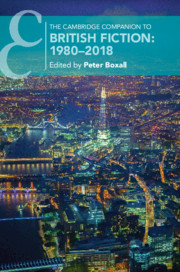Book contents
- The Cambridge Companion to British Fiction: 1980–2018
- The Cambridge Companion to
- The Cambridge Companion to British Fiction: 1980–2018
- Copyright page
- Dedication
- Contents
- Contributors
- Chronology
- Introduction: Framing the Present
- Part I Overview
- Part II New Formations
- Part III Genres and Movements
- Part IV Contexts
- Conclusion
- Further Reading
- Index
- Cambridge Companions to …
Part III - Genres and Movements
Published online by Cambridge University Press: 12 June 2019
- The Cambridge Companion to British Fiction: 1980–2018
- The Cambridge Companion to
- The Cambridge Companion to British Fiction: 1980–2018
- Copyright page
- Dedication
- Contents
- Contributors
- Chronology
- Introduction: Framing the Present
- Part I Overview
- Part II New Formations
- Part III Genres and Movements
- Part IV Contexts
- Conclusion
- Further Reading
- Index
- Cambridge Companions to …
Summary
To write of ‘postmodernism’ is both to skate on thin ice and to tread familiar ground. Almost every piece of scholarship that uses this classification must begin, by convention it seems, with a lengthy tract on what precisely is meant by ‘the postmodern’. It is precarious ‘thin ice’ because these definitions are not always aligned with one another and are sometimes delicate. For instance, many of the tropes that one might call ‘postmodern’ and to which I will shortly turn are clearly exhibited in Romantic-era writing or in the epic of Melville’s Moby Dick (1851). Such definitional work is ‘familiar ground’, though, because the procedure has become so routinised as to appear mundane.
- Type
- Chapter
- Information
- The Cambridge Companion to British Fiction: 1980–2018 , pp. 135 - 198Publisher: Cambridge University PressPrint publication year: 2019

